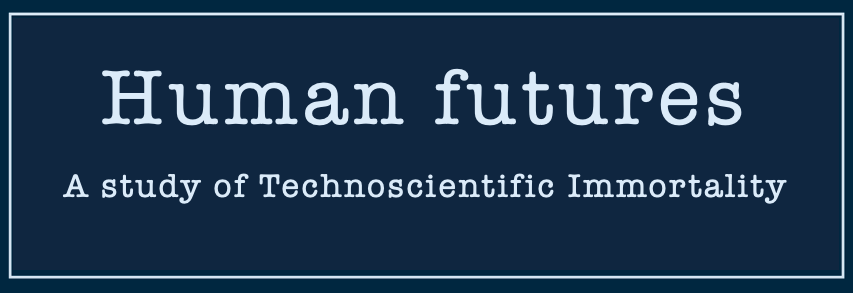This is an excerpt from my master thesis Managing chosen life(spans) – Cryopreservation in Europe. The thesis is based on 5 months of multi-sited fieldwork in Germany, Switzerland, the United Kingdom, and online. I met and spoke with people interested in, invested in and working with cryopreservation from across western Europe with the intention to gain an understanding of the what, how, who, and why of the field of cryopreservation in Europe. The excerpt is from chapter 4 of the thesis which discusses the ways in which my interlocutors imaging the future and how they work to change life from being a timed project to be open-ended. It describes the German cryopreservation company Tomorrow Biostasis´ (lack of) use of the word immortality and a conversation on the word immortality at the 2022 cryopreservation conference arranged by the European Biostasis Foundation (EFB). The full thesis is available here.
The I-word
Immortality is a word which, as I already have pointed out, was seldom used by my interlocutors. Tomorrow does not use “immortality” in any of their marketing. On their website it is rather “Live without a time constraint”.
Shying away from using the concept of immortality is, as I see it, another way in which the company Tomorrow is working to distance itself from anything that can associate them with speculation, religion, and fiction. As mentioned in chapter 2, separating cryopreservation from religion and pseudo-science is important for cryonicists. Immortality gives religious connotations in the promise of an eternal afterlife in a “heavenly” place, which is not something the secular cryonicists want to be associated with. It is important for Tomorrow to be recognized as scientific and medical. It may also be part of a strategy where they do not promise something they cannot know that they can give (immortality). This follows from Kendizorrias’s (CEO of Tomorrow Biostasis) idea of informed consent among customers. However, the phrasing of “without a time constraint”, is clearly also shorthand for indefinite life, and immortal life. The nuance here is interesting. Tomorrow is balancing on a very tightly rigged string, trying to manoeuvre the idea of living forever with the acceptable medical and scientific discourse they also need for gaining public legitimacy.
At one instance, however, I was encouraged by a Tomorrow employee to include the name of the larger project I am part of, “Technoscientific Immortality”, explicitly in my presentation for customers. It was at the beginning of my fieldwork at Tomorrow’s offices and I was sending out an interview request for Tomorrow members. The sensational name (Technoscientific Immortality) would, according to the employee, probably intrigue and apply to some of the members. During the interviews most said they wanted to live long but not forever. Some said indefinitely. Those who talked about immortality said it was not something they wanted or thought could be achieved. It was being able to have the freedom to choose the length of one’s own life which made them sign up for cryopreservation, not the promise of immortality.
Another episode from my fieldwork is indicative of this distinction between “indefinite lifespan” and “immortality”: At the EBF conference I was introducing my research to a group of researchers and leading figures in the cryopreservation field and mentioned the name of the research project (Technoscientific Immortality). One of them immediately shrugged and said “Ah, you know, we don’t really like that word.” He explained how immortality came with some ideas, without explicitly saying what ideas, and why cryonicists would like to distance themselves from them. He said the “I-word” was maybe used in the very early days of cryonics, but today it is more about having a “chosen lifespan” than living forever. There were nods of agreement from the rest of the group.
“Indefinite life”, “life without a time constraint”, “a chosen life span”, are all ways of speaking about a life where the problem of death is gone. Cryonicists` imaginations of not just the future, but their place in the future, are premised on the potential of not dying. This potential of not dying plays out in their future making. The temporality of the present and the future is also changed by and for cryonicists when life no longer is a timed project in an ever- progressing world.
“Immortalist” is the term used by Farman (2020) and probably reflects the early phase of the cryonics movement (pointed to above in the quote from my interlocutor), which Farman picked up on during his field studies in the late 2000s. It seems to me that the change in the discourse (from immortality to chosen lifespan) is a fairly recent one, and perhaps even a result of the new initiatives that Tomorrow represents. At the very least, this change is not described by Farman (2020), Bernstein (2019), or Romain (2010) (the only ones to have done ethnographic studies of the cryonics movement). Thus, my interlocutors would not describe themselves as “immortalists”. The project of cryopreservation is based on the idea of controlling death, and thus also controlling life; managing a chosen lifespan.
References sited
Bernstein, Anya. 2019. The Future of Immortality: Remaking Life and Death in Contemporary Russia. Princeton, New Jersey: Princeton University Press.
Farman, Abou. 2020. On Not Dying – Secular Immortality in the Age of Technoscience. Minneapolis: University of Minnesota Press
Romain, Tiffany. 2010. «Extreme Life Extension: Investing in Cryonics for the Long, Long Term.» Medical Anthropology 29: 194-215.
